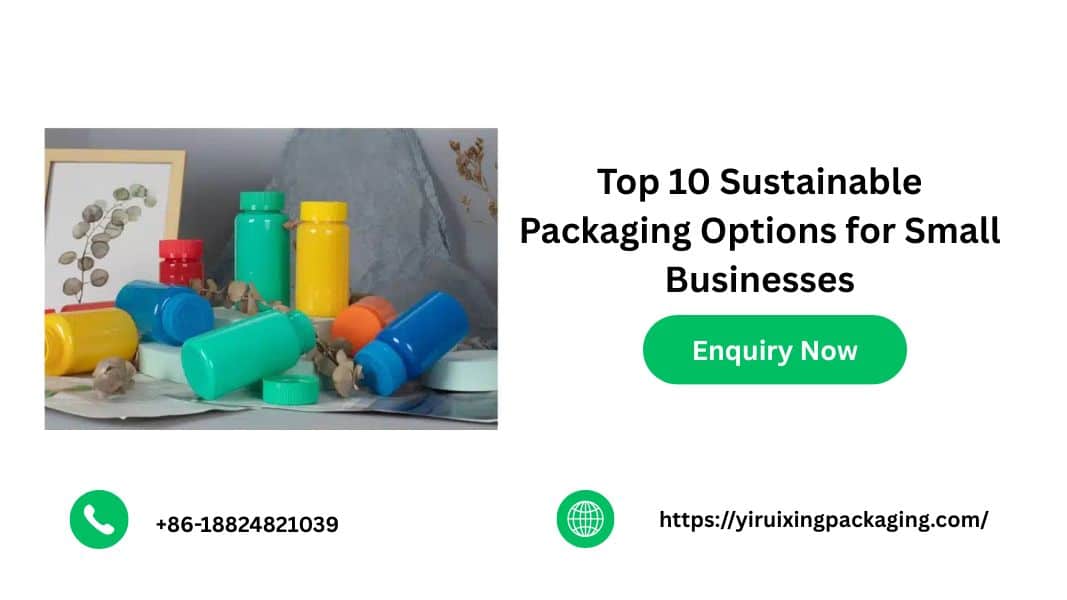Top 10 Sustainable Packaging Options for Small Businesses – As more customers become aware of their impact on the environment, small businesses are feeling the pressure to develop environmentally-friendly practices, especially in packaging. Sustainable packaging could be good for the earth, but can also contribute to brand value, build trust, and align businesses with the beliefs of today’s consumers. It would not matter whether your product is food, clothing, cosmetics, or electronics; many eco-packaging options are flexible, affordable, and effective. Here are the Top 10 Sustainable Packaging Options for Small Businesses.
Table of Contents
ToggleList Of The Top 10 Sustainable Packaging Options for Small Businesses
1. Recycled Paper and Cardboard
Recycled paper and cardboard are probably the most popular eco-conscious packaging options. Recycled paper and cardboard are biodegradable, widely available, and customizable. A huge number of businesses, including food, clothing, bags, inserts, etc., can make suitable use of recycled cardboard, including practical box sizes, shipping boxes, wrapping paper, cardboard inserts, etc. Recycled corrugated cardboard is an exceptionally printable and flexible material for branding.
2. Compostable Mailers
Compostable mailers made from cornstarch, PLA (polylactic acid), or other plant-derived materials would be a great option for small businesses that ship lightweight goods such as clothing, books, etc. Depending on the material, these biodegradable mailers can break down into compost (in a home composter) and produce no toxic residuals on disposal. Compostable mailers are less bulky than cardboard mailing boxes, and yours will carry a cleaner environmental footprint than piles of plastic poly mailers. Some compostable mailers may benefit from moisture resistance, be durable, and impress your customers.
3. Mushroom Packaging
Mushroom packaging is a unique and biodegradable packaging solution made from mycelium (the roots of a mushroom) and agricultural waste. It is lightweight, shock-resistant, and works well with fragile products like glass goods, electronic goods, or candles. Mushroom packaging can decompose in just a few weeks, making it one of the most eco-conscious packaging solutions available.
4. Biodegradable packing peanuts
Styrofoam packing peanuts have been called an environmental hazard in studies. Fortunately, packing peanuts made from starch have become available and offer a biodegradable and safe alternative. Starch packing peanuts dissolve in water, which makes these non-toxic peanuts great void fillers around fragile products. Many small e-commerce businesses use packing peanuts as their void fill because they are less costly and are fairly effective.
5. Reusable fabric bags
Reusable fabric packaging can be a sustainable packaging option for smaller businesses that sell premium or boutique products like jewelry, cosmetics, or other artisan products. Cotton, jute, or hemp bags work as branded merchandise, and they encourage customers to reuse shopping bags over and over again. Even though reusable fabric bags are more expensive than plastic or paper bags, they also create a luxurious feel, and they will last longer depending on use.
6. Glass Containers
If you are a business in the beverage, food, or skincare industry, glass containers offer a sustainable alternative to plastic packaging options. Glass is infinitely recyclable, non-toxic, and does an excellent job preserving the freshness of your product. While denser than other materials, it does lend an upscale appearance and can usually be reused or repurposed by customers.
7. Corrugated Bubble Wrap
As an alternative to plastic bubble wrap, corrugated bubble wrap is a packaging material made from upcycled corrugated cardboard. It is a great protective material to cushion fragile goods with both recyclable and compostable properties. Moreover, this product provides a cost-effective, environmentally responsible packaging choice that still provides product protection during shipping while reducing waste associated with single-use plastic.
8. Plant-Based Plastics (Bioplastics)
Plant-based plastics (also known as bioplastics) use renewable or sustainable raw materials as opposed to petroleum. Source materials include corn, sugar cane, or potato starch. Not all bioplastics are compostable; however, most plastics can be either industrially biodegraded or recycled. Because plant-based plastics could have the same look and usage as traditional plastics, they have a reduced environmental impact, making them suitable transitional packaging options for businesses moving away from proprietary petroleum-based packaging.
9. Recyclable Aluminum Packaging
Aluminum is a high-value recyclable product and can be reused again and again without any loss in quality. It can be used as a packaging format for beverages and cosmetics, as well as packaged food products. Aluminum containers are often seen as lightweight and resistant to impact with an upscale look, and as such, are widely found in more modern, sustainable brands.
10. Minimalist Packaging
Sometimes, the most sustainable approach is to use as little packaging as appropriate. Minimalist packaging approaches refer to any effort to use as little material as possible while still protecting your product. This can be done by using smaller boxes, using only one type of material, or removing unnecessary layers of packaging like plastic wrap or laminated labels. Not only saves waste, but it also reduces shipping costs and builds trust for your brand’s environmental credentials.
Yiruixing Packaging: Bring Your Eco-Friendly Brand to the Next Level
Yiruixing Packaging offers quality, sustainable packaging solutions designed for a variety of products, from cosmetics and electronics to gourmet foods and handmade gifts. Yiruixing Packaging’s boxes are sturdy, customizable, and environmentally responsible—all made from recyclable and biodegradable materials. They come in a range of sizes, styles, and finishes that can be customized to showcase your brand while staying true to your mission of eco-friendliness. Whether you need a sleek presentation box or a strong shipping solution, Yiruixing Packaging provides packaging that protects your product and the environment.
Conclusion
Sustainable packaging is an essential part of responsible business practice, not just a trend. For small businesses, choosing environmentally friendly packaging can solidify brand loyalty, reduce their environmental footprint, and even save money in the long run. As you invest in green packaging today, you are doing your part in creating a better future for the planet, but you are also future-proofing your business in a world that is increasingly concerned about sustainability.
FAQs Related to Sustainable Packaging
What is the cheapest sustainable packaging option for small businesses?
Recycled paper and cardboard are generally the cheapest eco-conscious packaging materials. They are adaptable, relatively easy to brand, and can be placed in curbside recycling.
Are compostable mailers durable enough to ship with?
Compostable mailers are surprisingly durable. They are made from materials like cornstarch and PLA, and, though lightweight, can resist tearing and water, and are perfectly acceptable for shipping the lightest products.
How can I brand sustainable packaging?
Most eco-packaging options are printable or otherwise branded. You can print with soy ink, use biodegradable stickers or sleeves, or stamp your logo onto your packaging. Branding does not have to be at odds with being sustainable, and can be beautiful and sustainable.
Will moving to sustainable packaging raise my costs?
Some eco-friendly options will cost slightly more than regular packaging might cost you in the starting. Factors like reduced material use, lower shipping weights, and growing customer loyalty due to your sustainable initiatives will ultimately help to balance your costs with time.





